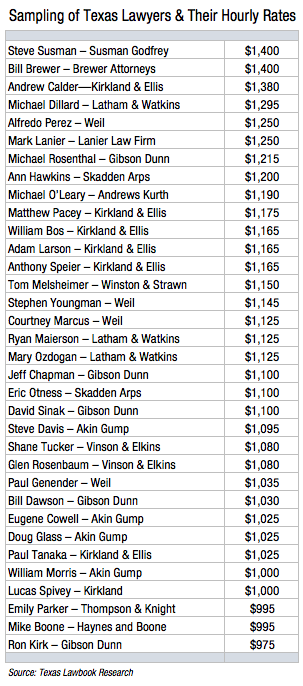Corporate law firms based in Texas are hiking the hourly rates they charge their business clients by 10 percent or more for the most experienced attorneys whose legal specialties are in high demand.
As a result, scores of Texas lawyers now charge $1,000 or more per hour for their legal services. Another 200 business attorneys practicing in the state are likely to cross the $1,000-an-hour threshold over the next two to three years.
In fact, several national law firms operating in Texas now bill as much as $480 an hour for rookie lawyers only one or two years out of law school – a fact that disturbs corporate general counsel even more than the $1,000 an hour for seasoned attorneys.
Businesses across Texas received letters during the past few weeks from the law firms that represent them delivering news of the higher rates.
More than two-dozen corporate general counsel told The Texas Lawbook in exclusive interviews that the law firms they use for litigation, regulatory and transactional matters have announced rate increases ranging from five to 10 percent.

“Quite frankly, some of the rate increases are even larger than 10 percent,” says Carlos Hernandez, the chief legal officer at Irving-based Fluor Corp. “It is crazy that $900 an hour is commonplace and $1,000 is no longer shocking.”
Many corporate general counsel agree.
“We have certainly seen lawyer rates escalate during the past few years,” says Total Petrochemicals & Refining General Counsel Elizabeth Matthews. “It can be hard to explain to our business clients how a particular lawyer is worth [for example] $1,000 an hour.”
Six years ago, the number of Texas lawyers who charged $1,000 could be counted on one hand.
Today, there are at least 100 business attorneys practicing in Dallas, Houston and Austin who bill their corporate clients between $1,000 and $1,400 an hour, according to Texas Lawbook research of federal bankruptcy records, court fee applications and interviews with law firm insiders and corporate general counsel.
The Texas Lawbook identified two-dozen Texas lawyers who list $995 as their hourly rates. More than 180 lawyers practicing in the state have hourly rates between $900 and $995 and another 220 who charge between $800 and $895 an hour.
“Rates have blown up in recent years,” says Rudy Rodriguez, the general counsel at CEC Entertainment, the parent company of Chuck E. Cheese’s. “You can still find reasonable rates in Texas, but you have to shop around.”
“It seems every corporate transactional lawyer in Texas now charges $950 an hour or more,” says Stephen Coats, the general counsel and partner at the New York private equity firm Riverstone Holdings.
“Texas lawyers used to be a great bargain, especially when compared to New York lawyer rates,” says Coats, who employs several firms in Texas to advise in acquisitions and joint ventures. “Not so much anymore.”
Texas Lawbook research found that about 15 Texas trial lawyers, including Tom Melsheimer at Winston & Strawn, Rob Walters and Bill Dawson at Gibson Dunn, Harry Reasoner at Vinson & Elkins, Yvette Ostolaza at Sidley Austin and Steve Susman at Susman Godfrey, garner $1,000 an hour or more.
A great majority of $1,000-an-hour lawyers in Texas practice corporate transactional law, including Mark Kelly at V&E, Mike O’Leary at Andrews Kurth, Michael Dillard of Latham & Watkins, Courtney Marcus at Weil, Gotshal & Manges and Jeff Chapman of Gibson, Dunn & Crutcher.
“Rates at the large law firms have definitely risen the past year or two. It makes you re-assess what work needs to be done by these top tier firms and what can be handled by regional firms with lower rates,” says RSP Permian General Counsel James Mutrie. “Only a small portion of the legal work I have requires the services of $1,000-an-hour lawyers.”
Mutrie and others say that the rates of legal specialists, such as those practicing tax law, advising on securities offerings and IPOs or bet-the-company intellectual property disputes, seem to have gone up disproportionately.

“I have a difficult time grasping that $1,000 an hour is deserved, but I will pay it if I need that specific lawyer for a specific case,” says Chris Luna, senior legal director at MetroPCS in Richardson. “There is still a difference in the fees of New York versus Texas lawyers, but that difference has decreased dramatically in the past two or three years.
“When I have a basic real estate lease to be reviewed, I do not need a $950-an-hour lawyer working on it,” Luna says. “A $350-an-hour lawyer will do just fine. It’s not brain surgery.”
Some corporate general counsel are pushing back.
“I cannot afford the big national law firms, and I cannot afford $1,000 an hour,” says Classic Industries General Counsel John Clement. “I frankly wonder if any lawyer is truly worth $1,000 an hour.”
Clement says he has seen rate increases from the law firms he employs, but he says he uses the same law firms to achieve discounts.
“I am able to hire some of the best lawyers in Texas and still only pay $500 to $650 an hour,” Clement says.
Legal industry analysts and corporate general counsel say that rates were flat or stagnant from 2008 through 2012, but that changed as elite national law firms opened outposts in Dallas and Houston.
Texas Lawbook research found that more than two-thirds of the $1,000-an-hour lawyers practicing in Texas are partners at those national law firms, including Gibson Dunn, Kirkland & Ellis, Latham, Sidley Austin, Simpson Thatcher & Bartlett and Weil.
The national law firms charged higher rates, which gave Texas-based law firms the cover needed to significantly raise their own rates.
Baker Botts and V&E are the two Texas-based firms that have the most $1,000-an-hour lawyers. Both firms have more than 20 lawyers charging four figures, according to court records and interviews with legal industry analysts.

“I don’t pay $1,000 an hour to lawyers very often,” says Halliburton General Counsel Robb Voyles. “There are only a handful of lawyers in Texas who can command [such] high rates, in my opinion. Every four or five years, we go through rate hike spurts, and we are witnessing it now.”
Even so, Voyles says he does not squabble much with the lawyers he hires about rates.
“I understand that this is law firm economics and that their time or the hours are their product to sell,” Voyles says. “The rates need to be such that law firms can pay to attract and retain quality lawyers in order to keep them from being poached from other law firms.”

AT&T General Counsel David McAtee says it is “a fact of life that lawyer rates will go up,” but he says the amount of the increases in Texas during the past couple years “has been startling.”
While McAtee and several other leading general counsel say they are not happy with the hike in legal rates, money is not always a key factor.
“We don’t ignore hourly rates, but rates seldom play a meaningful role in our decision to hire outside counsel,” says Lennox International Chief Legal Officer John Torres. “We focus on the value that our outside counsel can provide our legal department and the business.

“I look at the level of expertise and effort required and how law firms promote efficiency in how they handle our work,” Torres says. “Law firms in Texas are as good as any on the planet.”
The Texas Lawbook found significant disparities in law firm rates. Bankruptcy records show that Texas-based corporate partners with at least 15 years of experience at Kirkland, Latham and Gibson have rates ranging from $1,100 to $1,385 an hour. The same level partners at Baker Botts and V&E charge between $875 and $1,175 an hour. Meanwhile, 15-year corporate partners at Gardere or Winstead have rates between $535 and 775 an hour. At Gray Reed, partners with that same experience charge between $425 to $550 an hour, according to federal bankruptcy records.
By comparison, corporate associate with five years experience at Gray Reed has hourly rates between $375 and $425. Lawyers with that same experience level at Baker Botts and V&E bill $525 to $650 an hour. Meanwhile, Gibson Dunn, Kirkland and Latham set the hourly rates for the five-year corporate associates between $675 and $850 an hour.
Many general counsel say that trying to get firms to agree to reduce fees or discount rates doesn’t seem to work.
“I had a partner at a large law firm admit to me that he would give me discounts, [but] that he would make up the difference by simply billing me for more hours,” Hernandez says.

